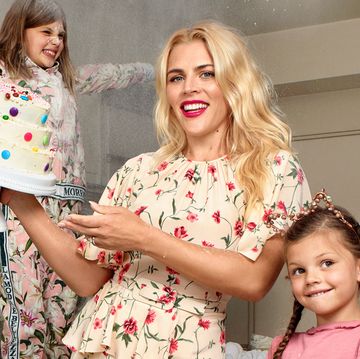Women have been grappling with the gendered division of labor since, you know, the turn of the century. This discontent took a turn during the second Industrial Revolution, when many hoped that women’s work outside the home would bring about change in the division of labor inside the home.
No such revolution happened.
In fact, according to a recent United Nations report, the modern woman still does nearly three times as much unpaid domestic work as a man. Sure, men are taking on more responsibility than they traditionally have in the past, but even the most well-intentioned men are still not doing their fair share at home.
In other words, the unpaid job of scrubbing the toilet still falls on us. It’s women’s work. This model begins in childhood, when girls begin shouldering 50 percent more of the household work than boys. These “gendered messages are seeping into our tender little psyches” from a very young age, writes Sara Petersen about the early messaging that sets girls up to be babysitters and household helpers, and who later become women who assume the majority of the cooking, cleaning, and childcare in their adult homes.
But at what cost? I thought a lot about the toll that an encumbered mind was taking on me. It was impacting every aspect of my life, and I wanted to take the discussion wider, beyond my own family and friends. I went into full “quest” mode, asking women everywhere—in airports and coffee shops, in grocery checkout lines, on the playground and Little League fields—to consider the costs of this mental load in several different aspects of their lives.
For starters:
Consider the cost to your partnership or marriage...
In the form of exhaustion, resentment, and resigned to feeling alone and isolated in your relationship. I posted the following question on social media: When I think about who does the majority of household work and childcare in my household, I feel_______.
Out of a pool of 150 women that I sourced from active mommy groups, a version of the following three responses rose to the top:
“I feel like running away to escape the exhaustion.”
“I feel pissed off at my husband.”
“I feel that this will always be my role.”
I found similar sentiments echoed in Twitter feeds, Facebook chats, and social media memes. The groundswell of “The Invisible Workload Is Killing Me and My Marriage” messaging was bubbling up in conversations and publications everywhere. In a revealing series on modern divorce, writer Lyz Lenz shares, “I stopped cooking because I wanted to feel as unencumbered as a man walking through the door of his home with the expectation that something (everything) had been done for him. I wanted to be free of cutting coupons and rolling dough and worrying about dinnertimes and feeding. I wanted to rest. To be just like him and sit with the kids and play.”
When you multiply this feeling of being overwhelmed, resentment, and resignation over and over and over again, it’s no shock that a recent study found women who were tasked with more invisible household work than their husbands were more likely to be dissatisfied in their marriages.
Consider the cost to your identity...
In the form of a lost sense of your pre-parent self, and a feeling of disconnection from the passions and purpose that make you uniquely you.
When getting the baby out of the car seat and safely into the stroller, applying sunscreen to sensitive cheeks, placing a lovey and sippy cup onto baby’s lap and speaking in your most soothing mama bear voice to suppress a came-out-of-nowhere deafening meltdown—all so that you can walk from the parking lot and into the pharmacy for a fresh tube of nipple cream in the same quasi-pajama pants you wore yesterday (and maybe the day before) feels like the biggest accomplishment in the world—do you ever think, Who have I become? You’re not alone.
“It’s really a dance where you lean in to take care of your baby, but you have to lean out to take care of yourself,” says reproductive psychiatrist Alexandra Sacks. “Because you’re still a human being, and you still have to care for your own body, your own emotions, your relationship with your partner, with your friends, your intellectual life, your spiritual life, your hobbies . . . all these other aspects of your identity and your basic needs. Even if you want to just give unconditionally to your child, you can’t, because we’re humans. We’re not robots.”
Consider the cost to your career...
In the form of the pay gap between mothers and non-mothers, which—GET THIS—is wider than the pay gap between men and women. “Whether women work at Walmart or on Wall Street, getting pregnant is often the moment [women] are knocked off the professional ladder,” asserted a recent New York Times investigative piece. Did you know that you took an economic risk becoming a mother? That’s because in our culture, “mom” has been deemed the she-fault, de facto household manager and caretaker. If the school calls, Mom picks up. If a child is sick, Mom stays home. If the dry cleaning/rent check/prescription order needs to be dropped off, Mom gets to work late, even though her workday already began many hours earlier in order to get her children out of bed, fed, dressed, and dropped at daycare.
Then, once at work, up pops an email forwarded from your husband that makes your stomach turn:
Subject: Inspection Reminder for plate number GEG8612
With a hurried note: This appointment is today. Can’t get away from the office. Can you handle?
You take a deep breath and think, Sure, honey, I’ll leave work early AGAIN and spend my afternoon waiting in line at the DMV.
Imagine if you could forward just a handful of the household and child-related emails you receive to your spouse or partner to “handle”? How much mental relief would that provide to you? When our husbands press forward because they know we will take care of it, they get to stay committed at work and receive the rewards of higher pay for their disproportionate willingness to work longer and less flexible hours. Hop on a plane to Las Vegas for a conference in the middle of the week? No problem for many husbands/fathers. Meanwhile, we fight to stay valuable at the office and also be on call for any daily disruption or domestic interruption at home. I call that double-committed. Well, certainly, overcommitted.
When you consider the “mommy tax” that decreases a mother’s earning power by 5 to 10 percent for every child she brings into the world due to missed opportunities for promotions, prestigious assignments, pay increases, and bonuses, then you understand the true price of motherhood. “For most companies, the ideal worker is ‘unencumbered,’ that is, free of all ties other than those to his job. Anyone who can’t devote
all his or her energies to paid work is barred from the best jobs and has a permanently lower lifetime income,” writes author Ann Crittenden. “Not coincidentally, almost all the people in that category happen to be mothers.”
“They don’t work as hard,” is how a Plano, Texas, doctor explained in the Dallas Medical Journal as to why female doctors’ salaries amounted to about two-thirds of their male counterparts’. “Most of the time their priority is something else. . . . Family, social, whatever.”
Don’t you just love that? Clearly he’s never done the “whatever.” We expect women to work like they don’t have children and raise children as if they don’t work.
Consider the cost to your wellness...
In the form of exhaustion, stress, and compromised mental bandwidth. In a survey done by Today that interviewed more than 7,000 moms across the country, most rated their stress levels at an 8.5 out of 10, mirroring a recent report by the scientific journal Brain and Behavior, showing women are twice as likely to be affected by anxiety disorders as men.
As I expanded my focus group, I began conducting more rigorous research to explore this “stress gap.” Because I’m not a trained mental health professional or an academic, I sought out expert voices on the subject. Number one on my list was Darby Saxbe, a psychology professor at the University of Southern California and researcher on the gendered division of labor. Saxbe also lives in Los Angeles, so we agreed to meet at Din Tai Fung to share soup dumplings and swap insights on the health and wellness industry.
Before Saxbe took her first bite, she said, “I’ll let you in on a secret. The wellness industry is certainly hip to imbalanced gender roles. How many beauty messages have you received in the last month via email or social media that offer a cosmetic remedy for battling fatigue or overworked and tired skin?” she asked me.
I took a sip of my tea and guessed, “Twenty?”
“At least, right? Women need to ask themselves—what’s more transformative to my life? A new serum for dark circles or a more fair and balanced division of labor in my home?”
This got us laughing over a new revolutionary skin care campaign: Hydration or a more helpful husband?
“The latter is a better bet for tackling tired skin.” Saxbes miled. “But joking aside, women are suffering.”
I interjected, “Did you see that recent survey by Healthy Women and Working Mother? Seventy-eight percent of moms say they are so busy maintaining family stability by being constantly available, mentally and physically, to deal with every detail of home life that they aren’t taking care of them-selves?”
“And because so many of us have less unwinding and restorative time,” said Saxbe, “we’re generating more of the stress hormone cortisol. This is toxic to women’s health.”
Consider the cost to our society...
Robbed of valuable productivity and top female leadership and talent as 43 percent of highly qualified women with children take a career detour. This includes college-educated women who invested in an education and who presumably never planned to exit the workforce . . . but many do so anyway, feeling that they grossly underestimated the demands and difficulty of combining work and parenting. “I went from running a company to banging a spoon on my head to keep my baby occupied and entertained,” sighed Elaine, who holds three degrees from Ivy League schools.
Today, women earn the majority of undergraduate and graduate degrees and are now breadwinners in four out of 10 families—and still a meaningful number of women (like me) significantly scale back or “opt out” of the workforce. A good number of them never return to work outside the home after having children, and those who do, research shows, often return to lower-paying jobs with lower earnings trajectories.
Do you, too, feel that you cannot be as “ambitious” as your male counterparts because you’re at mental overload, caring for children and running a household while also working on starting, building, or establishing your career? Then you can get a sense of how many more women in their homes and communities across the country are saying: How can any of us possibly lean in if we can’t rely on consistent contributions from our partners?
“It’s not actually motherhood or kids that derail women’s careers and personal ambitions—it’s men who refuse to do their fair share,” writes author and columnist Jessica Valenti. “If fathers did the same kind of work at home that mothers have always done, women’s careers could flourish in ways we haven’t yet imagined.” My friend Jenny Galluzzo, co-founder of Second Shift, a company that helps women remain engaged and succeed in the workplace, breaks it down like this: “AMBITION gap, my ass. What we’re dealing with is an exhaustion gap!”
Having to remind your partner to do something doesn’t take that something off your list. It adds to it. And what’s more, reminding is often unfairly characterized as nagging. (Almost every man interviewed in connection with this project said nagging is what they hate most about being married, but they also admit that they wait for their wives to tell them what todo at home.) It’s not a partnership if only one of you is running the show, which means making the important distinction between delegating tasks and handing off ownership of a task. Ownership belongs to the person who first off remembers to plan, then plans, and then follows through on every aspect of executing the plan and completing the task without reminders.
A survey conducted by Bright Horizons—an on-site corporate childcare provider—found that 86 percent of working mothers say they handle the majority of family and household responsibilities, “not just making appointments, but also driving to them and mentally calendaring who needs to be where, and when.” In order to save us from big-time burnout, we need our partners to be more than helpers who carry out instructions that we’ve taken time and energy to think through (and then who blame us when things fall through the cracks). We need our partners to take the lead by consistently picking up a task week after week—and completely taking it off our mental to-do list by doing every aspect of what the task requires. Otherwise we still worry about whether the task is being done as we would do it, or done fully, or done at all—which leaves us still shouldering the mental and emotional load for the “help” or the “favor” we had to ask for.
But how do we get our partners to take that initiative and own every aspect of a household or childcare responsibility without being (nudge, nudge) told what to do? Or, to simply figure it out? That’s what I needed to figure out.
If we want our partners to feel empowered and capable of succeeding, rather than clueless or helpless until directed, we have to ditch the maternal gatekeeping control (e.g., It’s my way or move out! ) and create way more context (e.g., Here’s how it’s done from start to finish—and why we’ve agreed to do it this way). Couples who adopt the Fair Play system know exactly what tasks are in play within their homes, along with explicitly defined and mutually agreed-upon expectations for each task and clear, delineated roles and responsibilities that help rebalance the domestic work load with fairness. Imagine your home life with such efficiency. It’s no longer a sh*t show!














